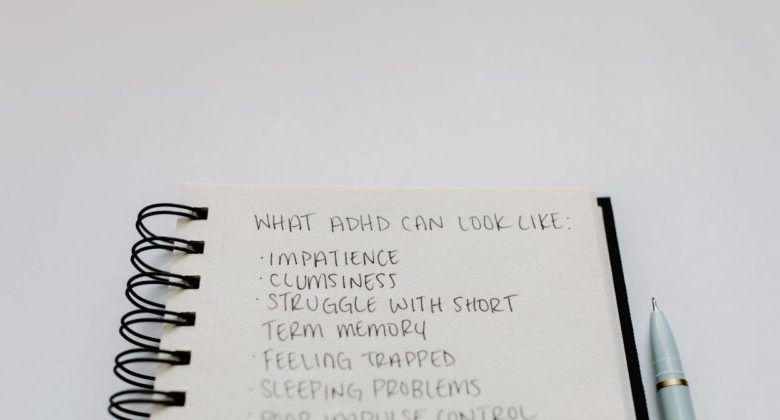Managing ADHD in Daily Life

If you have ADHD, you probably know how even the tiniest change in your plans can completely derail your day.
It’s not even about missing an appointment or losing track of deadlines—it’s about trying to keep up with an ever-changing to-do list while your mind races with a million thoughts and interruptions.
Basically, your life often seems like one big muddled heap of I-should-be-doing-something-but-I’m-not.
Well, the good news is that there are some practical strategies and tools that can help you manage this whirlwind and regain a sense of control.
From using smart scheduling apps to breaking tasks into manageable chunks, there are ways to make your daily life a bit smoother.
Just remember: These strategies aren’t about fixing ADHD—they’re about finding systems that work with your way of thinking and living.
Let’s dig right into them.
Debunking Common Myths About ADHD
Raise your hand if you’ve been diagnosed with ADHD and have heard any of these at least once in your life:
- “You can focus, you just chose not to.”
- “You only pay attention to things you want to do.”
- “You aren’t trying hard enough.”
- “You’re just making excuses.”
- “ADHD is just a label for lazy kids.”
- “ADHD is overdiagnosed.”
These misconceptions about ADHD are incredibly common. And you know what?
They can be incredibly hurtful to someone who’s just trying to navigate life with a supercharged brain that’s constantly buzzing with ideas, but can’t seem to stay focused on a single task for more than a few minutes.
It’s exhausting, frustrating, and often misunderstood.
So, let’s debunk these myths once and for all.
ADHD isn’t about laziness or lack of willpower; it’s about a neurological difference that affects how our brains process information.
This means that individuals with ADHD often struggle with mental processes that help us plan, organize, and control our thoughts and actions. ADHD can also make it difficult to pay attention to details, stay on task, or resist distractions.
Now, does this neurological difference have to be fully debilitating? Absolutely not!
Many individuals with ADHD lead successful lives by learning to manage their symptoms effectively. That is why in the rest of this article, we’ll discuss practical coping strategies that can help you manage ADHD and live a more fulfilling life.
ADHD Strategy for Scheduling and Prioritizing Tasks
You’re trying to clean your room. You look around and see a mountain of laundry, a pile of books, and a desk covered in papers.
It’s overwhelming, right?
You might start thinking, “Where do I even begin?” and before you know it, you’re scrolling through your phone, avoiding the task altogether.
This is a classic example of the paralysis of choice, a thing that happens way too often to people diagnosed with ADHD.
Now, you’ve probably already tried a million different to-do lists and productivity apps to solve this issue. They all seem like fancy ways to write things down, but they never quite address the real problem – the sheer number of things staring you down.
Here’s a tip that might actually be helpful: it involves Google Calendar, Google Tasks, and automatic schedulers.
You put in your existing calendar commitments, like meetings and doctor’s appointments, then fill Google Tasks with all the things you need to get done. After that, you set up automatic scheduling to clock out time on your calendar for each task.
Most of these apps allow you to adjust due dates or add more time to tasks, so they automatically reschedule to fit everything in.
Pretty cool, right?
ADHD Strategy for Time management
You’ve probably heard the popular productivity tip, “Eat the frog first.”
This means tackling your most challenging or important task as soon as you wake up.
While this strategy might work for some people, many individuals with ADHD have labeled it as counterproductive.
Why?
Well, people with ADHD often have trouble starting tasks, especially difficult ones. When we’re faced with an important task, our brains may go into overdrive, trying to find ways to avoid it.
This can lead to procrastination, anxiety, and ultimately, a decrease in productivity.
A better approach for many people with ADHD is to “eat the ice cream first.”
This means starting with a small, easy task that you know you can complete successfully. By getting a quick win under your belt, you can build momentum and get yourself motivated.
Here’s an example: Let’s say you need to write a 10-page paper. Instead of diving straight into the research and writing, start by creating an outline or brainstorming ideas. This is a smaller, less intimidating task that will help you get started. Once you have a basic structure, you’ll be more motivated to tackle the rest of the paper.
ADHD Strategy for Focus and Concentration
First things first, everyone’s brain is different. What works for one person may not work for another.
Still, there are some strategies that seem to work for many people diagnosed with ADHD, starting with setting clear goals.
For instance, instead of thinking, “I need to finish this report,” try saying, “I need to finish the first section of this report by 2 PM.” This gives you a specific target to aim for.
Many people have also noted that exercise does wonders for their focus, even if it’s just taking a short walk to reset your brain.
Next, create a distraction-free zone where you can work without interruptions. This might mean turning off your phone, closing unnecessary tabs on your computer, or even wearing noise-canceling headphones.
Lastly, don’t forget to take short breaks. The Pomodoro technique, where you work for 25 minutes and then take a 5-minute break, is a popular choice, but you do whatever works for you!
ADHD Strategy for Note-Taking and Organization
Taking notes can be a challenge for people with ADHD, especially in classrooms and during work meetings.
When approaching this challenge, we suggest that you first identify a method that works best for you.
You see, some people prefer digital note-taking apps, while others find that classic pen and paper is the most effective. Experiment with different methods to see what works best for you.
Once you’ve chosen a method, focus on the key points.
Don’t try to write down everything all at once. Instead, focus on the most important information to avoid getting overwhelmed and distracted.
We found that visual aids can also be helpful. Things like diagrams, charts, and images – basically anything that can help you remember information better and make your notes more interesting.
Expert tip: Google some structured note-taking methods, like the Cornell method, the outline method, and mind mapping. Those seem to be popular suggestions within the community.
ADHD Strategy for Impulsive Behavior
After chatting with a few people who have ADHD, they’ve shared some really helpful tips on the topic of impulsive behavior.
Before we dive deeper into them, let’s highlight a common theme: It’s all about pausing and reflecting before you act. This gives your brain a chance to think things through and make a more informed decision.
For example, one person mentioned how they struggled to choose between different forms of entertainment, like books or games. They felt an urge to start something new, but then couldn’t stick with it.
As you can see, identifying your “Start Now” triggers is a crucial step here.
Ask yourself: What situations or emotions make you more likely to act impulsively? Once you know your triggers, you can develop strategies to manage them.
Another person mentioned the challenge of getting started on projects, even ones they were interested in.
When others weighed in on the matter, they suggested forcing yourself to do whatever it is you think you want to do, even for a short period. This can help you overcome the initial hurdle and get the ball rolling.
Lastly, someone shared how talking about their goals with others gave them a sense of accomplishment, making them less likely to actually follow through.
This is called the “reward trap” and it can be overcome by keeping your plans to yourself until you’ve made some progress.
Note: Some of the people we’ve talked with mentioned that medication helps them suppress impulses a bit. However, since not everyone chooses medication to manage their ADHD, and we’re not medical professionals, ADHD supplements are something you should talk about with your healthcare provider instead.
ADHD Strategy for Listening Attentively
It’s hard when you deal with a disorder that pretty much openly states that you have a deficit when it comes to being attentive.
If you, too, struggle with listening because you find yourself thinking about their next thought or something else entirely, don’t worry – we got you!
To combat this, try focusing on the conversation at hand.
Avoid multitasking by putting away your phone and giving the speaker your full attention. Also, practice active listening by paraphrasing what the other person has said and asking clarifying questions.
If you still find it difficult to stay focused, use visual aids like taking notes or drawing diagrams, like suggested earlier. This can help you remember what the other person is saying and stay engaged.
Super-important: Think about letting your friends and family know about your ADHD, as it can really help if they understand how it affects your listening skills. If they notice you’re drifting off, they can gently bring you back to the conversation. And if you find it easier to focus when you fidget or look somewhere else, you’ll feel less pressured to mask it when you have friends who know, understand, and are patient about your situation.




